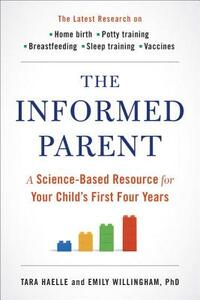Take a photo of a barcode or cover
28 reviews for:
The Informed Parent: A Science-Based Resource for Your Child's First Four Years
Emily Willingham, Tara Haelle
28 reviews for:
The Informed Parent: A Science-Based Resource for Your Child's First Four Years
Emily Willingham, Tara Haelle
Liked:
- section on violence and screens
- info on childhood obesity.
Issues:
-Citations should be easily traceable from claim to location.
- overly focused on SIDS. Don't read this if you want to avoid being traumatized about SIDS.
- Focused largely (like 3/4 of the book) on preconception to 6 months. What about the other 4 years? Read another book for pregnancy info.
- Doesn't think for itself, with the exception of the co- sleeping chapter. Most of that information is readily found on the WHO, CDC, or APA websites.
See other reviews ranging from 1-3 stars for an accurate portrayal.
Edit: I really love that on Goodreads you can see what other books they have written(though there are plenty of glitches). Taking a brief glance at that gives you a better idea of specialties and pet topics.
- section on violence and screens
- info on childhood obesity.
Issues:
-Citations should be easily traceable from claim to location.
- overly focused on SIDS. Don't read this if you want to avoid being traumatized about SIDS.
- Focused largely (like 3/4 of the book) on preconception to 6 months. What about the other 4 years? Read another book for pregnancy info.
- Doesn't think for itself, with the exception of the co- sleeping chapter. Most of that information is readily found on the WHO, CDC, or APA websites.
See other reviews ranging from 1-3 stars for an accurate portrayal.
Edit: I really love that on Goodreads you can see what other books they have written(though there are plenty of glitches). Taking a brief glance at that gives you a better idea of specialties and pet topics.
This is really about pregnancy, birth, and infants. A short section about discipline and daycare/preschool covers the next 3 years. If you've never looked into any of the topics covered,this book could be useful, but most people I know have googled this all before.
Some interesting information, but it was far more broad brush than Expecting Better and therefore did not feel as comprehensive or science/research-based.
Great tone & I loved the authors banter. Already read several early parenting books so I was hoping this one covered more of toddler & up. The book gives a great overview of topics.
If you are looking for quick, easy answers, this is not the book for you (except when it comes to vaccinations. That chapter is pretty clear.)
Modern parenting is a quagmire of conflicting "expert" advice and even more convoluted anecdotal evidence. Everyone seems to have a certain parenting philosophy that they swear by (and judge other parents accordingly). This book is for those who want to know which parenting practices or decisions actually DO have an evidence base -- and the reality is, not a lot of them do. Chapters that I really wanted to confirm my own biases failed to deliver, while I remained somewhat mystified on subjects I am truly on the fence about. That's because, when it comes to parenting, there is not a ton of hard evidence about what works and what doesn't, despite myriad claims that would lead you to believe otherwise. However, this book is upfront about all of that, and where evidence exists (even when it's contradictory), you will find an overview of it here. The authors have looked at and analyzed the studies out there so that you don't have to, and the book is organized roughly chronologically, making it very easy to find what you are looking for whether your current conundrum is potty training or home birth. I read it more-or-less straight through, but I will keep it around so I can continue to reference different sections as they become relevant.
For the most part, it left me feeling like I should follow my instincts or parental preferences on most issues for which no hard evidence exists either way -- but that I really have no right to feel smug about those choices or that they are unequivocally the "right" ones. And on the issues for which very clear evidence DOES exist, it behooves parents to do their best to respond accordingly. (i.e.: VACCINATE YOUR KIDS.)
Modern parenting is a quagmire of conflicting "expert" advice and even more convoluted anecdotal evidence. Everyone seems to have a certain parenting philosophy that they swear by (and judge other parents accordingly). This book is for those who want to know which parenting practices or decisions actually DO have an evidence base -- and the reality is, not a lot of them do. Chapters that I really wanted to confirm my own biases failed to deliver, while I remained somewhat mystified on subjects I am truly on the fence about. That's because, when it comes to parenting, there is not a ton of hard evidence about what works and what doesn't, despite myriad claims that would lead you to believe otherwise. However, this book is upfront about all of that, and where evidence exists (even when it's contradictory), you will find an overview of it here. The authors have looked at and analyzed the studies out there so that you don't have to, and the book is organized roughly chronologically, making it very easy to find what you are looking for whether your current conundrum is potty training or home birth. I read it more-or-less straight through, but I will keep it around so I can continue to reference different sections as they become relevant.
For the most part, it left me feeling like I should follow my instincts or parental preferences on most issues for which no hard evidence exists either way -- but that I really have no right to feel smug about those choices or that they are unequivocally the "right" ones. And on the issues for which very clear evidence DOES exist, it behooves parents to do their best to respond accordingly. (i.e.: VACCINATE YOUR KIDS.)
Exhaustive, but not exhausting. You can use this book in place of a Google search to find very recent data (generally 2012 and newer) on a wide range of topics that weigh on every parent's mind. The tone is matter-of-fact and the authors do a good job of maintaining impartiality on each topic. And far from a dry, monotonous data dump, the authors write with a stylish flair that keeps the energy up. It seemed cumbersome to read cover-to-cover but very accessible for skipping around to answer pertinent questions as they arose, despite a tendency to refer to previous families and/or case studies covered in preceding chapters.
3 stars out of 5.
3 stars out of 5.
This one was a very similar read to Expecting Better, which I read a little while ago. I think it was ambitious in how much it tried to cover - possibly too ambitious. Some of the early years information was interesting when thinking about the children I work with.
No bibliography and no in text citations.
don’t trust people to give you correct information just bc they are economists !
don’t trust people to give you correct information just bc they are economists !
I read a lot of this kind of stuff on the Internet, so a lot of this wasn't totally new to me BUT it is a useful reference and might be awesome for someone expecting their first kid. It's a good reference, though pretty drily written, with little narrative.
Generally a disappointing read. The authors take you through a dizzying review of inadequate studies only to say "we don't know" in each chapter.
The only real conclusions I noticed were:
* vaccination is good
* spanking is bad
* feeding your children is good
* kind and empathetic parenting is... good.
The only real conclusions I noticed were:
* vaccination is good
* spanking is bad
* feeding your children is good
* kind and empathetic parenting is... good.




